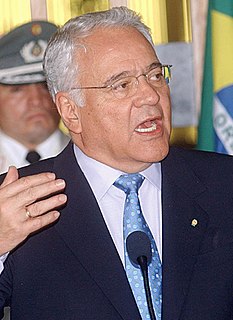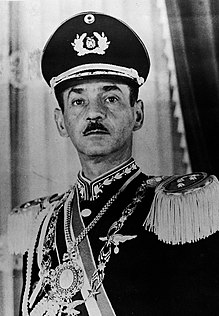The Revolutionary Nationalist Movement–Alliance (Spanish: Movimiento Nacionalista Revolucionario-Alianza, MNRA) was a centrist electoral political alliance in Bolivia.
The MNRA was formed in 1979 by
In 1979 presented as its presidential candidate Víctor Paz Estenssoro (MNR) and Luis Ossio Sanjines (PDC) as vice-presidential candidate and in 1980 presented Víctor Paz Estenssoro (MNR) and Ñuflo Chávez Ortiz (MNR). [2]

The Christian Democratic Party is a Christian-democratic political party in Bolivia.

The Revolutionary Party of the Nationalist Left was a left-wing political party in Bolivia. It was founded in 1963 by the labor leader Juan Lechín Oquendo and by Mario Torres Calleja and Edwin Moller in lesser roles. The PRIN seceded from the Revolutionary Nationalist Movement (MNR) in protest against Víctor Paz Estenssoro's decision to seek a third elected term as president in 1964, rather than permit then Vice-President Juan Lechín to have the MNR's presidential nomination.

The Revolutionary Left Front is a political party in Bolivia, founded in 1978.

General elections were held in Bolivia on 6 June 1993. As no candidate for the presidency received over 50% of the vote, the National Congress was required to elect a president on 4 August. Gonzalo Sánchez de Lozada of the MNR-MRTKL alliance was subsequently elected unopposed.

General elections were held in Bolivia on 1 July 1979. As no candidate in the presidential elections received a majority of the vote, the National Congress was required to elect a President. However, the Congress failed to elect a candidate after three ballots and instead selected Senate leader Wálter Guevara to serve as Interim President for a year on 8 August. Guevara was later overthrown by a military coup led by Alberto Natusch on 31 October. Fresh elections were held in June 1980.

General elections were held in Bolivia on 29 June 1980, the third in three years. As no candidate in the presidential elections received a majority of the vote, the National Congress was required to elect a President on 6 August. With Hernán Siles Zuazo of the Democratic and Popular Union the favourite to win the Congressional ballot, the process was disrupted on 17 July by the military coup led by General Luis García Meza Tejada. However, Meza was pressured to resign on 4 August 1981, resulting in General Celso Torrelio becoming president. In July 1982 he was replaced by General Guido Vildoso, who was named by the high command to return the country to democratic rule. On 17 September 1982, during a general strike that brought the country close to civil war, the military decided to step down, to reconvene the National Congress elected in 1980, and to accept its choice of president. Accordingly, the National Congress revalidated the 1980 election results on 23 September and overwhelmingly elected Hernán Siles Zuazo as president on 5 October. He subsequently assumed the presidency on 10 October 1982.

General elections were held in Bolivia on 14 July 1985. As no candidate for the presidency received over 50% of the vote, the National Congress was required to elect a President on 4 August. Although Hugo Banzer of Nationalist Democratic Action (ADN) received the most public votes, Congress elected Víctor Paz Estenssoro of the Revolutionary Nationalist Movement (MNR).
The Republican Socialist Unity Party was a political party founded on 10 November, 1946 in Bolivia as the fusion of the Republican Socialist Party, the Genuine Republican Party, the United Socialist Party, and the Independent Socialist Party.
The Authentic Revolutionary Party was a political party in Bolivia.
The Popular Christian Movement was a political party in Bolivia, de facto controlled by the military junta.
The Nationalist Union of the People was a right-wing, pro-military electoral political alliance in Bolivia.
The Leftwing Revolutionary Nationalist Movement was a centre-left political party in Bolivia.
The Christian Democratic Union was a right-wing Christian-democratic political party in Bolivia.
The Tupac Katari Revolutionary Movement is a left-wing political party in Bolivia.
The Democratic Alliance of National Revolution was a centrist electoral political alliance in Bolivia.
The Revolutionary Party of the National Left – Gueiler was a small centrist political party in Bolivia.
The United Revolutionary Nationalist Movement was a right-wing political party in Bolivia.
The Alliance of Nationalist Left Forces of the MNR was a leftist political party in Bolivia.
The Revolutionary Nationalist Movement–Julio was a pro-military political party in Bolivia.
The Bolivian National Congress 1979–1980 was elected on 1 July 1979.